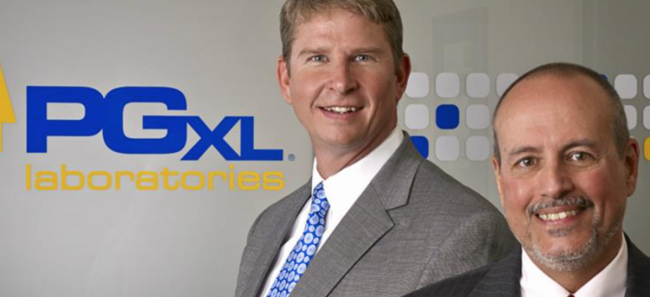You have /5 articles left.
Sign up for a free account or log in.

Mark Linder and Roland Valdes
In a highly unusual move, the University of Louisville Foundation is suing a faculty member at the institution it was founded to support over a $3.5 million loan.
That faculty member, Roland Valdes, a longtime professor of pathology and laboratory medicine and of biochemistry and molecular biology, says the foundation’s move will chill the “entrepreneurial spirit and activities we as a university are trying to promote and seemingly support.”
Ahead of Its Time
Noting that the foundation was a part owner in the now-defunct Pharmacogenetics Diagnostic Laboratory, Valdes described the project as a “spin-out” from his academic research, including a university-owned patent. He said the both the university and the medical school’s administration encouraged his business.
Valdes co-founded PGXL, as the lab was known, in 2004, on the cusp of what is now known as personalized medicine. The lab’s initial focus was on genetic testing to help physicians improve selection and dosing of medications, and the enterprise was successful for a time. It generated tens of millions in revenue and serviced 120,000 patients nationwide, by Valdes’s accounting. It created about 250 full-time jobs and won millions in federal and in-state grants, he said.
Then the lab met its well-documented demise, caused largely by federal rule reversals as to what pharmacogenomics testing the Centers for Medicare and Medicaid Services would cover. Labs around the country struggled to adapt, and Valdes said that his was able to sustain itself longer than most. Medicare is now paying for some of the tests it stopped funding, as they became what Valdes called “standard practice,” he added.
Ultimately, though, Valdes said, PGXL didn’t have the capital to survive the transition. It filed for bankruptcy in 2016, due to Medicare overpayment claims.
Louisville’s foundation invested in PGXL and helped guarantee $3.5 million line of credit for it in 2014. It held a seat on the company’s board and was regularly involved in making decisions, Valdes said.
But the foundation is suing its former business partner, based on a personal guarantee that Valdes made before the foundation would guarantee a loan, as required by the bank.
Now that PGXL has defaulted on that loan, the foundation wants back the money it had to pay the bank as a result.
‘Most Unfortunate’
Both the university and Louisville’s medical school referred questions back to the foundation, which did not respond to requests for comment directly or through its public relations firm.
Valdes called the lawsuit “most unfortunate,” saying that the foundation failed to consider how much its involvement in the lab aligned with its mission “to help the local economy and benefit the [university] community. Most unfortunate not to see and recognize the whole picture.”
Valdes, who has been a professor at Louisville for nearly 30 years, says he’s conducted himself with “respect and loyalty,” and that he’ll continue to do so now.
Mark Linder, another professor of pathology and laboratory medicine at Louisville who co-founded PGXL, is not named in the suit and did not immediately respond to a request for comment.
The foundation's lawsuit is pending a Kentucky circuit court.
Michael Olivas, William B. Bates Distinguished Chair in Law at the University of Houston Law Center and former general counsel to American Association of University Professors, said he had no intimate knowledge of the Louisville case, but that the foundation is “a disaster waiting to happen, yet again.”
Louisville’s foundation has had a rocky few years, to put it lightly. James Ramsey resigned in 2016 as both university president and foundation president after several scandals. An independent 2017 report on the foundation’s finances, ordered after Ramsey’s ouster, detailed extreme mismanagement, financial and otherwise. And, earlier this year, the university and the foundation sued Ramsey and other former foundation officials. The university faces other troubles.
Olivas said he wouldn’t rule out a university foundation ever suing a professor, however bad a look it is. But here, he said, the Louisville foundation should be “lining up with other creditors,” perhaps in bankruptcy court -- not pursuing a civil case against an individual faculty member.
Olivas also said it’s not unusual for foundations to help faculty members with their start-ups, but that these are typically “arm’s-length agreements, lawyered up on both sides.” Offering a professor a $3.5 million line of credit does not seem like that kind of risk-controlled agreement, he added.
Yet, given the foundation’s history, Olivas said “the surprising thing to me isn’t that this happened -- surprising to me is that the foundation still exists,” without a major restructuring. “It’s sucked everybody into the tar pit with it.”









